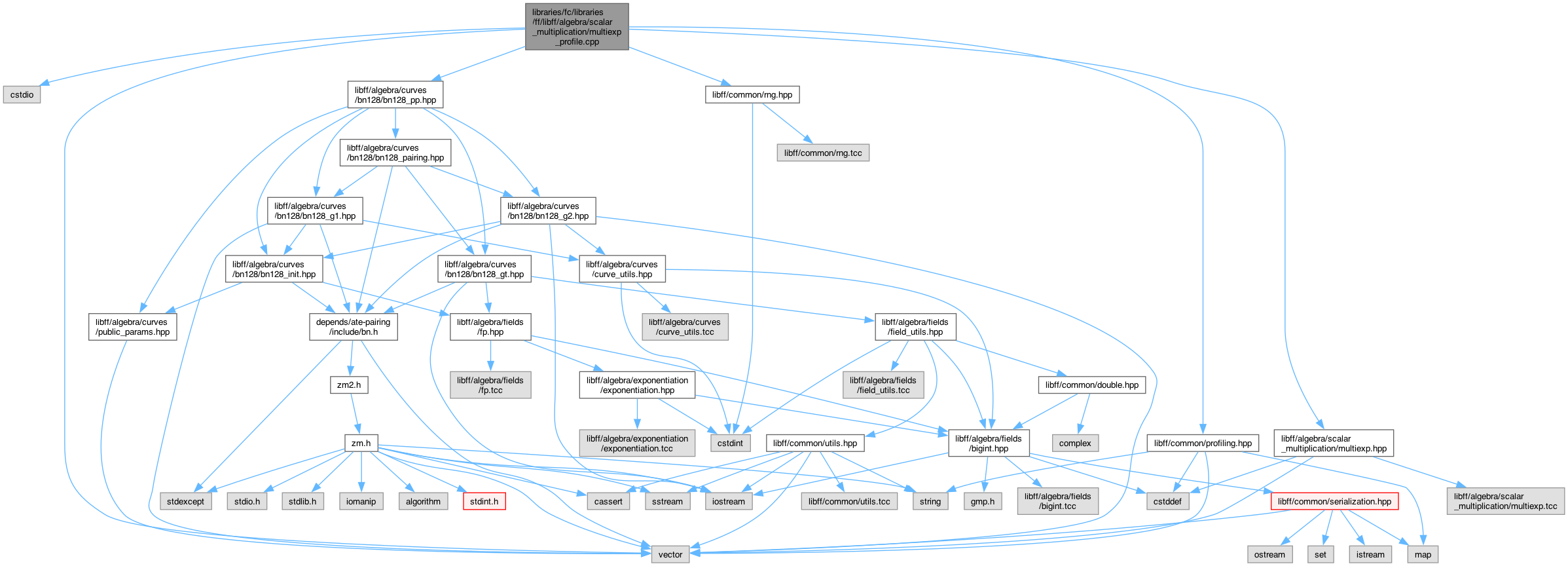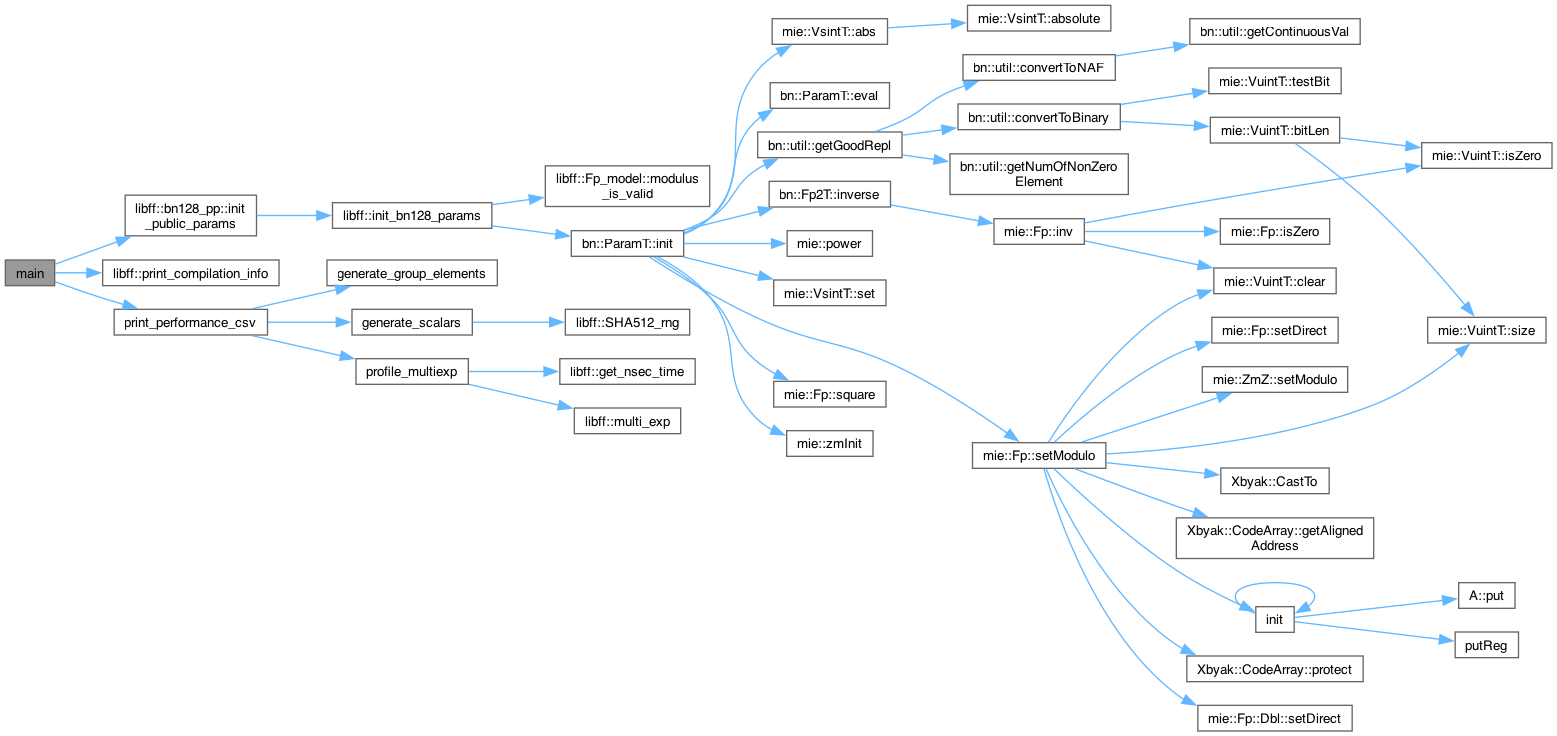Loading...
Searching...
No Matches
#include <cstdio>#include <vector>#include <libff/algebra/curves/bn128/bn128_pp.hpp>#include <libff/algebra/scalar_multiplication/multiexp.hpp>#include <libff/common/profiling.hpp>#include <libff/common/rng.hpp>
Include dependency graph for multiexp_profile.cpp:

Go to the source code of this file.
Typedefs | |
| template<typename GroupT > | |
| using | run_result_t = std::pair<long long, std::vector<GroupT> > |
| template<typename T > | |
| using | test_instances_t = std::vector<std::vector<T> > |
Functions | |
| template<typename GroupT > | |
| test_instances_t< GroupT > | generate_group_elements (size_t count, size_t size) |
| template<typename FieldT > | |
| test_instances_t< FieldT > | generate_scalars (size_t count, size_t size) |
| template<typename GroupT , typename FieldT , multi_exp_method Method> | |
| run_result_t< GroupT > | profile_multiexp (test_instances_t< GroupT > group_elements, test_instances_t< FieldT > scalars) |
| template<typename GroupT , typename FieldT > | |
| void | print_performance_csv (size_t expn_start, size_t expn_end_fast, size_t expn_end_naive, bool compare_answers) |
| int | main (void) |
Typedef Documentation
◆ run_result_t
template<typename GroupT >
| using run_result_t = std::pair<long long, std::vector<GroupT> > |
Definition at line 12 of file multiexp_profile.cpp.
◆ test_instances_t
template<typename T >
| using test_instances_t = std::vector<std::vector<T> > |
Definition at line 15 of file multiexp_profile.cpp.
Function Documentation
◆ generate_group_elements()
template<typename GroupT >
| test_instances_t< GroupT > generate_group_elements | ( | size_t | count, |
| size_t | size ) |
Definition at line 18 of file multiexp_profile.cpp.
19{
20 // generating a random group element is expensive,
21 // so for now we only generate a single one and repeat it
23
25 GroupT x = GroupT::random_element();
26 x.to_special(); // djb requires input to be in special form
28 result[i].push_back(x);
29 // result[i].push_back(GroupT::random_element());
30 }
31 }
32
33 return result;
34}
Here is the caller graph for this function:

◆ generate_scalars()
template<typename FieldT >
| test_instances_t< FieldT > generate_scalars | ( | size_t | count, |
| size_t | size ) |
Definition at line 37 of file multiexp_profile.cpp.
38{
39 // we use SHA512_rng because it is much faster than
40 // FieldT::random_element()
42
46 }
47 }
48
49 return result;
50}
FieldT SHA512_rng(const uint64_t idx)
Here is the call graph for this function:

Here is the caller graph for this function:

◆ main()
| int main | ( | void | ) |
Definition at line 116 of file multiexp_profile.cpp.
117{
118 print_compilation_info();
119
121 bn128_pp::init_public_params();
123
126
127 return 0;
128}
void print_performance_csv(size_t expn_start, size_t expn_end_fast, size_t expn_end_naive, bool compare_answers)
Definition multiexp_profile.cpp:73
LOGGING_API void printf(Category category, const char *format,...)
Definition Logging.cpp:30
Here is the call graph for this function:

◆ print_performance_csv()
template<typename GroupT , typename FieldT >
| void print_performance_csv | ( | size_t | expn_start, |
| size_t | expn_end_fast, | ||
| size_t | expn_end_naive, | ||
| bool | compare_answers ) |
Definition at line 73 of file multiexp_profile.cpp.
78{
79 for (size_t expn = expn_start; expn <= expn_end_fast; expn++) {
81
82 test_instances_t<GroupT> group_elements =
83 generate_group_elements<GroupT>(10, 1 << expn);
84 test_instances_t<FieldT> scalars =
85 generate_scalars<FieldT>(10, 1 << expn);
86
87 run_result_t<GroupT> result_bos_coster =
89 group_elements, scalars);
91
92 run_result_t<GroupT> result_djb =
94 group_elements, scalars);
96
97 if (compare_answers && (result_bos_coster.second != result_djb.second)) {
98 fprintf(stderr, "Answers NOT MATCHING (bos coster != djb)\n");
99 }
100
101 if (expn <= expn_end_naive) {
102 run_result_t<GroupT> result_naive =
104 group_elements, scalars);
106
107 if (compare_answers && (result_bos_coster.second != result_naive.second)) {
108 fprintf(stderr, "Answers NOT MATCHING (bos coster != naive)\n");
109 }
110 }
111
113 }
114}
std::pair< long long, std::vector< GroupT > > run_result_t
Definition multiexp_profile.cpp:12
run_result_t< GroupT > profile_multiexp(test_instances_t< GroupT > group_elements, test_instances_t< FieldT > scalars)
Definition multiexp_profile.cpp:53
test_instances_t< FieldT > generate_scalars(size_t count, size_t size)
Definition multiexp_profile.cpp:37
test_instances_t< GroupT > generate_group_elements(size_t count, size_t size)
Definition multiexp_profile.cpp:18
Here is the call graph for this function:

Here is the caller graph for this function:

◆ profile_multiexp()
template<typename GroupT , typename FieldT , multi_exp_method Method>
| run_result_t< GroupT > profile_multiexp | ( | test_instances_t< GroupT > | group_elements, |
| test_instances_t< FieldT > | scalars ) |
Definition at line 53 of file multiexp_profile.cpp.
56{
58
59 std::vector<GroupT> answers;
60 for (size_t i = 0; i < group_elements.size(); i++) {
61 answers.push_back(multi_exp<GroupT, FieldT, Method>(
62 group_elements[i].cbegin(), group_elements[i].cend(),
63 scalars[i].cbegin(), scalars[i].cend(),
64 1));
65 }
66
68
70}
T multi_exp(typename std::vector< T >::const_iterator vec_start, typename std::vector< T >::const_iterator vec_end, typename std::vector< FieldT >::const_iterator scalar_start, typename std::vector< FieldT >::const_iterator scalar_end, const size_t chunks)
Here is the call graph for this function:

Here is the caller graph for this function:
